Aili Chen
HER: Human-like Reasoning and Reinforcement Learning for LLM Role-playing
Jan 29, 2026Abstract:LLM role-playing, i.e., using LLMs to simulate specific personas, has emerged as a key capability in various applications, such as companionship, content creation, and digital games. While current models effectively capture character tones and knowledge, simulating the inner thoughts behind their behaviors remains a challenge. Towards cognitive simulation in LLM role-play, previous efforts mainly suffer from two deficiencies: data with high-quality reasoning traces, and reliable reward signals aligned with human preferences. In this paper, we propose HER, a unified framework for cognitive-level persona simulation. HER introduces dual-layer thinking, which distinguishes characters' first-person thinking from LLMs' third-person thinking. To bridge these gaps, we curate reasoning-augmented role-playing data via reverse engineering and construct human-aligned principles and reward models. Leveraging these resources, we train \method models based on Qwen3-32B via supervised and reinforcement learning. Extensive experiments validate the effectiveness of our approach. Notably, our models significantly outperform the Qwen3-32B baseline, achieving a 30.26 improvement on the CoSER benchmark and a 14.97 gain on the Minimax Role-Play Bench. Our datasets, principles, and models will be released to facilitate future research.
MiniMax-M1: Scaling Test-Time Compute Efficiently with Lightning Attention
Jun 16, 2025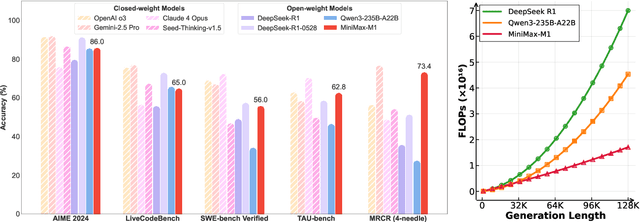

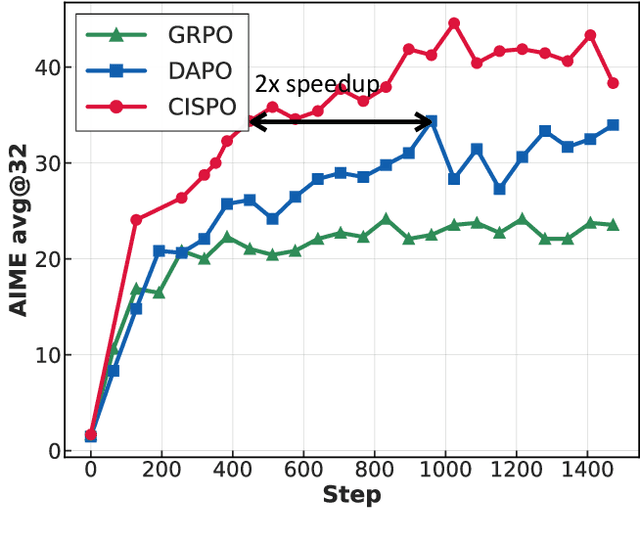
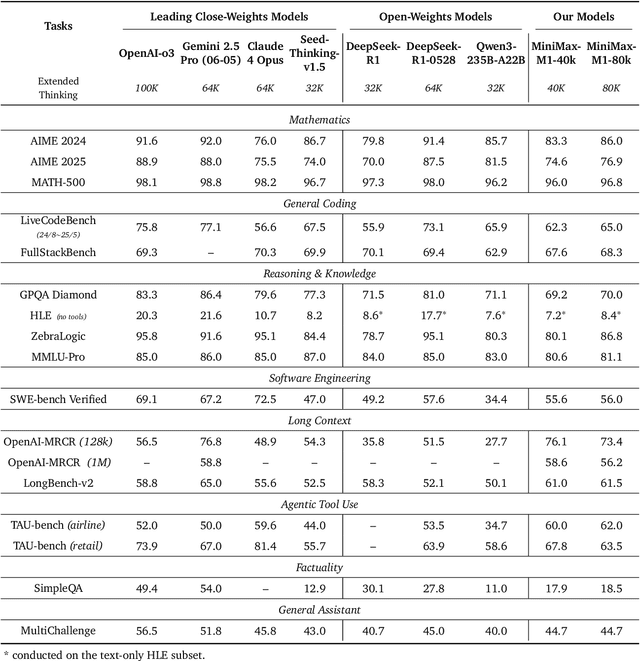
Abstract:We introduce MiniMax-M1, the world's first open-weight, large-scale hybrid-attention reasoning model. MiniMax-M1 is powered by a hybrid Mixture-of-Experts (MoE) architecture combined with a lightning attention mechanism. The model is developed based on our previous MiniMax-Text-01 model, which contains a total of 456 billion parameters with 45.9 billion parameters activated per token. The M1 model natively supports a context length of 1 million tokens, 8x the context size of DeepSeek R1. Furthermore, the lightning attention mechanism in MiniMax-M1 enables efficient scaling of test-time compute. These properties make M1 particularly suitable for complex tasks that require processing long inputs and thinking extensively. MiniMax-M1 is trained using large-scale reinforcement learning (RL) on diverse problems including sandbox-based, real-world software engineering environments. In addition to M1's inherent efficiency advantage for RL training, we propose CISPO, a novel RL algorithm to further enhance RL efficiency. CISPO clips importance sampling weights rather than token updates, outperforming other competitive RL variants. Combining hybrid-attention and CISPO enables MiniMax-M1's full RL training on 512 H800 GPUs to complete in only three weeks, with a rental cost of just $534,700. We release two versions of MiniMax-M1 models with 40K and 80K thinking budgets respectively, where the 40K model represents an intermediate phase of the 80K training. Experiments on standard benchmarks show that our models are comparable or superior to strong open-weight models such as the original DeepSeek-R1 and Qwen3-235B, with particular strengths in complex software engineering, tool utilization, and long-context tasks. We publicly release MiniMax-M1 at https://github.com/MiniMax-AI/MiniMax-M1.
Can LLMs Learn to Map the World from Local Descriptions?
May 27, 2025Abstract:Recent advances in Large Language Models (LLMs) have demonstrated strong capabilities in tasks such as code and mathematics. However, their potential to internalize structured spatial knowledge remains underexplored. This study investigates whether LLMs, grounded in locally relative human observations, can construct coherent global spatial cognition by integrating fragmented relational descriptions. We focus on two core aspects of spatial cognition: spatial perception, where models infer consistent global layouts from local positional relationships, and spatial navigation, where models learn road connectivity from trajectory data and plan optimal paths between unconnected locations. Experiments conducted in a simulated urban environment demonstrate that LLMs not only generalize to unseen spatial relationships between points of interest (POIs) but also exhibit latent representations aligned with real-world spatial distributions. Furthermore, LLMs can learn road connectivity from trajectory descriptions, enabling accurate path planning and dynamic spatial awareness during navigation.
ARM: Adaptive Reasoning Model
May 26, 2025



Abstract:While large reasoning models demonstrate strong performance on complex tasks, they lack the ability to adjust reasoning token usage based on task difficulty. This often leads to the "overthinking" problem -- excessive and unnecessary reasoning -- which, although potentially mitigated by human intervention to control the token budget, still fundamentally contradicts the goal of achieving fully autonomous AI. In this work, we propose Adaptive Reasoning Model (ARM), a reasoning model capable of adaptively selecting appropriate reasoning formats based on the task at hand. These formats include three efficient ones -- Direct Answer, Short CoT, and Code -- as well as a more elaborate format, Long CoT. To train ARM, we introduce Ada-GRPO, an adaptation of Group Relative Policy Optimization (GRPO), which addresses the format collapse issue in traditional GRPO. Ada-GRPO enables ARM to achieve high token efficiency, reducing tokens by an average of 30%, and up to 70%, while maintaining performance comparable to the model that relies solely on Long CoT. Furthermore, not only does it improve inference efficiency through reduced token generation, but it also brings a 2x speedup in training. In addition to the default Adaptive Mode, ARM supports two additional reasoning modes: 1) Instruction-Guided Mode, which allows users to explicitly specify the reasoning format via special tokens -- ideal when the appropriate format is known for a batch of tasks. 2) Consensus-Guided Mode, which aggregates the outputs of the three efficient formats and resorts to Long CoT in case of disagreement, prioritizing performance with higher token usage.
SynLogic: Synthesizing Verifiable Reasoning Data at Scale for Learning Logical Reasoning and Beyond
May 26, 2025Abstract:Recent advances such as OpenAI-o1 and DeepSeek R1 have demonstrated the potential of Reinforcement Learning (RL) to enhance reasoning abilities in Large Language Models (LLMs). While open-source replication efforts have primarily focused on mathematical and coding domains, methods and resources for developing general reasoning capabilities remain underexplored. This gap is partly due to the challenge of collecting diverse and verifiable reasoning data suitable for RL. We hypothesize that logical reasoning is critical for developing general reasoning capabilities, as logic forms a fundamental building block of reasoning. In this work, we present SynLogic, a data synthesis framework and dataset that generates diverse logical reasoning data at scale, encompassing 35 diverse logical reasoning tasks. The SynLogic approach enables controlled synthesis of data with adjustable difficulty and quantity. Importantly, all examples can be verified by simple rules, making them ideally suited for RL with verifiable rewards. In our experiments, we validate the effectiveness of RL training on the SynLogic dataset based on 7B and 32B models. SynLogic leads to state-of-the-art logical reasoning performance among open-source datasets, surpassing DeepSeek-R1-Distill-Qwen-32B by 6 points on BBEH. Furthermore, mixing SynLogic data with mathematical and coding tasks improves the training efficiency of these domains and significantly enhances reasoning generalization. Notably, our mixed training model outperforms DeepSeek-R1-Zero-Qwen-32B across multiple benchmarks. These findings position SynLogic as a valuable resource for advancing the broader reasoning capabilities of LLMs. We open-source both the data synthesis pipeline and the SynLogic dataset at https://github.com/MiniMax-AI/SynLogic.
Enigmata: Scaling Logical Reasoning in Large Language Models with Synthetic Verifiable Puzzles
May 26, 2025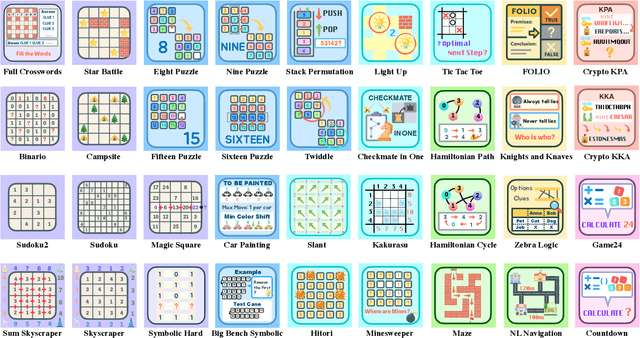
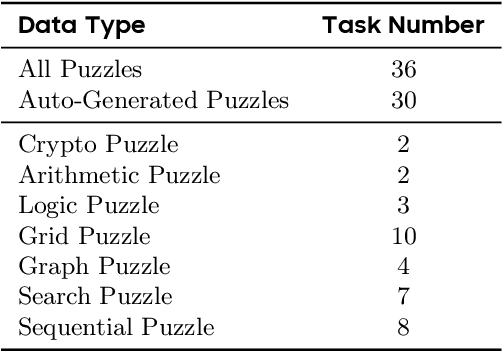


Abstract:Large Language Models (LLMs), such as OpenAI's o1 and DeepSeek's R1, excel at advanced reasoning tasks like math and coding via Reinforcement Learning with Verifiable Rewards (RLVR), but still struggle with puzzles solvable by humans without domain knowledge. We introduce Enigmata, the first comprehensive suite tailored for improving LLMs with puzzle reasoning skills. It includes 36 tasks across seven categories, each with 1) a generator that produces unlimited examples with controllable difficulty and 2) a rule-based verifier for automatic evaluation. This generator-verifier design supports scalable, multi-task RL training, fine-grained analysis, and seamless RLVR integration. We further propose Enigmata-Eval, a rigorous benchmark, and develop optimized multi-task RLVR strategies. Our trained model, Qwen2.5-32B-Enigmata, consistently surpasses o3-mini-high and o1 on the puzzle reasoning benchmarks like Enigmata-Eval, ARC-AGI (32.8%), and ARC-AGI 2 (0.6%). It also generalizes well to out-of-domain puzzle benchmarks and mathematical reasoning, with little multi-tasking trade-off. When trained on larger models like Seed1.5-Thinking (20B activated parameters and 200B total parameters), puzzle data from Enigmata further boosts SoTA performance on advanced math and STEM reasoning tasks such as AIME (2024-2025), BeyondAIME and GPQA (Diamond), showing nice generalization benefits of Enigmata. This work offers a unified, controllable framework for advancing logical reasoning in LLMs. Resources of this work can be found at https://seed-enigmata.github.io.
Think Thrice Before You Act: Progressive Thought Refinement in Large Language Models
Oct 17, 2024



Abstract:Recent advancements in large language models (LLMs) have demonstrated that progressive refinement, rather than providing a single answer, results in more accurate and thoughtful outputs. However, existing methods often rely heavily on supervision signals to evaluate previous responses, making it difficult to assess output quality in more open-ended scenarios effectively. Additionally, these methods are typically designed for specific tasks, which limits their generalization to new domains. To address these limitations, we propose Progressive Thought Refinement (PTR), a framework that enables LLMs to refine their responses progressively. PTR operates in two phases: (1) Thought data construction stage: We propose a weak and strong model collaborative selection strategy to build a high-quality progressive refinement dataset to ensure logical consistency from thought to answers, and the answers are gradually refined in each round. (2) Thought-Mask Fine-Tuning Phase: We design a training structure to mask the "thought" and adjust loss weights to encourage LLMs to refine prior thought, teaching them to implicitly understand "how to improve" rather than "what is correct." Experimental results show that PTR significantly enhances LLM performance across ten diverse tasks (avg. from 49.6% to 53.5%) without task-specific fine-tuning. Notably, in more open-ended tasks, LLMs also demonstrate substantial improvements in the quality of responses beyond mere accuracy, suggesting that PTR truly teaches LLMs to self-improve over time.
TravelAgent: An AI Assistant for Personalized Travel Planning
Sep 12, 2024



Abstract:As global tourism expands and artificial intelligence technology advances, intelligent travel planning services have emerged as a significant research focus. Within dynamic real-world travel scenarios with multi-dimensional constraints, services that support users in automatically creating practical and customized travel itineraries must address three key objectives: Rationality, Comprehensiveness, and Personalization. However, existing systems with rule-based combinations or LLM-based planning methods struggle to fully satisfy these criteria. To overcome the challenges, we introduce TravelAgent, a travel planning system powered by large language models (LLMs) designed to provide reasonable, comprehensive, and personalized travel itineraries grounded in dynamic scenarios. TravelAgent comprises four modules: Tool-usage, Recommendation, Planning, and Memory Module. We evaluate TravelAgent's performance with human and simulated users, demonstrating its overall effectiveness in three criteria and confirming the accuracy of personalized recommendations.
SelfGoal: Your Language Agents Already Know How to Achieve High-level Goals
Jun 07, 2024



Abstract:Language agents powered by large language models (LLMs) are increasingly valuable as decision-making tools in domains such as gaming and programming. However, these agents often face challenges in achieving high-level goals without detailed instructions and in adapting to environments where feedback is delayed. In this paper, we present SelfGoal, a novel automatic approach designed to enhance agents' capabilities to achieve high-level goals with limited human prior and environmental feedback. The core concept of SelfGoal involves adaptively breaking down a high-level goal into a tree structure of more practical subgoals during the interaction with environments while identifying the most useful subgoals and progressively updating this structure. Experimental results demonstrate that SelfGoal significantly enhances the performance of language agents across various tasks, including competitive, cooperative, and deferred feedback environments. Project page: https://selfgoal-agent.github.io.
From Persona to Personalization: A Survey on Role-Playing Language Agents
Apr 28, 2024



Abstract:Recent advancements in large language models (LLMs) have significantly boosted the rise of Role-Playing Language Agents (RPLAs), i.e., specialized AI systems designed to simulate assigned personas. By harnessing multiple advanced abilities of LLMs, including in-context learning, instruction following, and social intelligence, RPLAs achieve a remarkable sense of human likeness and vivid role-playing performance. RPLAs can mimic a wide range of personas, ranging from historical figures and fictional characters to real-life individuals. Consequently, they have catalyzed numerous AI applications, such as emotional companions, interactive video games, personalized assistants and copilots, and digital clones. In this paper, we conduct a comprehensive survey of this field, illustrating the evolution and recent progress in RPLAs integrating with cutting-edge LLM technologies. We categorize personas into three types: 1) Demographic Persona, which leverages statistical stereotypes; 2) Character Persona, focused on well-established figures; and 3) Individualized Persona, customized through ongoing user interactions for personalized services. We begin by presenting a comprehensive overview of current methodologies for RPLAs, followed by the details for each persona type, covering corresponding data sourcing, agent construction, and evaluation. Afterward, we discuss the fundamental risks, existing limitations, and future prospects of RPLAs. Additionally, we provide a brief review of RPLAs in AI applications, which reflects practical user demands that shape and drive RPLA research. Through this work, we aim to establish a clear taxonomy of RPLA research and applications, and facilitate future research in this critical and ever-evolving field, and pave the way for a future where humans and RPLAs coexist in harmony.
 Add to Chrome
Add to Chrome Add to Firefox
Add to Firefox Add to Edge
Add to Edge